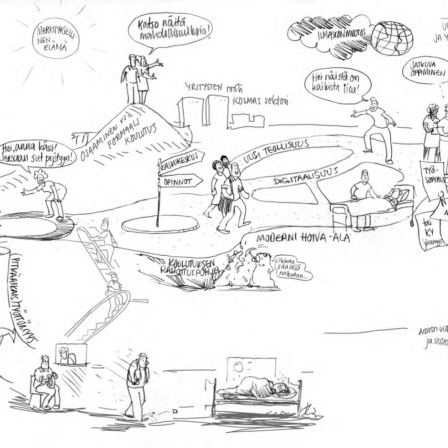How many municipal councillors or MPs have taken any personal involvement in foresight activities?
The National Foresight Network was convened as part of the Foresight Friday event at the Association of Finnish Local and Regional Authorities on Friday 30 November, to ponder the subject of municipalities of the future and the factors vital to their success.
For a foresight specialist like me, the event was inspiring in two ways.
Engaging in foresight activities alongside those in power
The first source of inspiration lay in the way in which the Association of Finnish Local and Regional Authorities implemented its major foresight process. The purpose of this process had been to examine the local authority of the future and the result was future images of municipalities (in Finnish). Instead of commissioning external consultants for the project, the association had engaged its own experts, leaders and councillors on a broad basis.
They began by collecting signals onto a group board on Pinterest. They then arranged trends into groups and processed them, before seeking future visions within each area. On the basis of their future visions and interpretations, they went on to build prototypes of the municipal services of the future.
When foresight activity is implemented in this way, the result is a process of collective learning among participants and stronger commitment to the final results. To those who make their living out of foresight work, there is nothing revolutionary about this. On the other hand, I view public organisations and decision-makers in particular as overly cautious about applying participatory foresight methods. I wonder how many municipal councillors or MPs have ever had any personal involvement in actual foresight work. And how many ministers? If you can think of any, please let me know in the comments section!
When faced with foresight data that you need to process into visions and concrete services, you usually also encounter an entirely new outlook about which you might otherwise have been oblivious. I believe that, right now, as Finland slogs through a quagmire of austerity and despair, we need future-oriented work more than ever as the basis of future visions and foresight – particularly among political leaders at various levels. Many thanks to the Association of Finnish Local and Regional Authorities for taking bold steps forward with this!
Case Pirkkala
The second aspect of my inspiration is associated with the previous one. At the event, we also heard of a municipality that is already turning its strong, future-oriented activity and faith into reality. That municipality is Pirkkala, which has given thought to its future vision as the political system changes and its municipal identity becomes based on something other than organising services. How to create an identity that places democracy and dynamism at the heart of municipal operations?
Pirkkala seems to have succeeded well in this. It is true that it had a good framework from the beginning: it is located next to the large city of Tampere, has good transport connections, a beautiful environment and a balanced municipal economy. Still, this is not enough if political leaders or civil servants lack the ability to reform and the willingness to attain a healthy governance culture. Pirkkala has had the will and ability to invest in both.
What do measures taken to secure future competencies look like in concrete terms? Pirkkala’s vision is centred around a contented community and municipality which provides a lively, happy environment in which people want to settle. In other words, the municipality dares to connect well-being to happiness, not just service provision and other traditional factors. Strong trust between politicians, civil servants and local residents is promoting the implementation of this vision. They have no intention of paying mere lip service to the “facilitating role of civil servants”, but want to genuinely think about what facilitation means and the skills it requires. They are adopting social media tools and understand that their use requires new skills and approaches, from both politicians and civil servants. They view dynamism as being about tearing down boundaries and are willing to co-operate with partner cities across national frontiers.
With social and healthcare reform just around the corner, now is a good time to re-examine regional and municipal identities. Many regions are already doing so. Last month, the Pirkanmaa Future Forum mapped the factors of future success and more major regional foresight events have been penned in for the spring. I will comment on these closer to the actual events. Before then, I hope that as many people as possible throw down the gauntlet to decision-makers, challenging them to join in their foresight activities.
Weekly notes is a series of blogs offering insights into the topical issues being discussed each week by Sitra’s research and strategy team. Our Weekly Notes are gathered together here.




Recommended